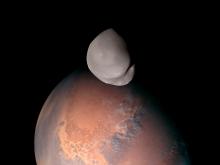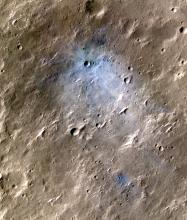Listen to today's episode of StarDate on the web the same day it airs in high-quality streaming audio without any extra ads or announcements. Choose a $8 one-month pass, or listen every day for a year for just $30.
You are here
Moon and Mars
The longest season of the year for those of us in the northern hemisphere begins today — the summer solstice. It’s the first day of summer and the longest day of the year. The season will last about 93 days — about four days longer than winter, the shortest season.
The lengths of the seasons are uneven on most of the other planets in the solar system, too. Their disparities can be much more dramatic. And the prime example is Mars.
It takes the Red Planet almost two years to orbit the Sun. So, on average, the seasons are almost twice as long as those on Earth. Northern summer, for example, lasts for 183 days.
But there’s a greater difference in the length of the seasons on Mars. That’s because the planet’s orbit is more stretched out than Earth’s orbit. When Mars is close to the Sun it moves faster than when it’s farther away, so it completes a larger portion of its orbit in less time.
Right now, Mars is closest to the Sun for the year. And it’s late in the planet’s northern fall season. That makes fall the shortest season of all — about 147 Earth days. On the other hand, Mars will be farthest from the Sun during northern spring. So it will last about 194 days — a difference of more than seven weeks — on a planet with lopsided seasons.
Look for Mars close to the left of the Moon at first light tomorrow. It looks like a bright orange star. Much brighter Jupiter stands to their upper right.
Script by Damond Benningfield






